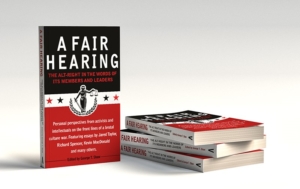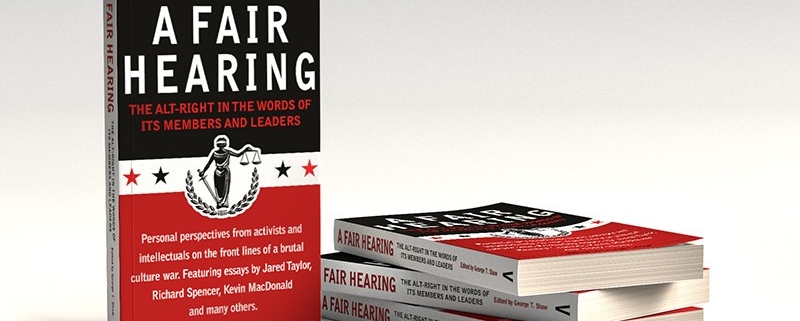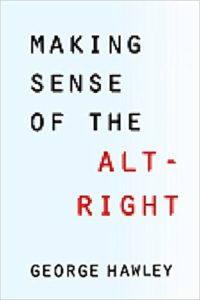Review: A Fair Hearing: The Alt-Right in the Words of Its Members and Leaders
 A Fair Hearing: The Alt-Right in the Words of Its Members and Leaders
A Fair Hearing: The Alt-Right in the Words of Its Members and Leaders
George T. Shaw (ed)
Arktos, 2018
“After absorbing the initial impact the alt-right remained intact and forward-oriented, no nearer or further from its goals, but now more serious and matured.” Thus remarks Evan McLaren, former Executive Director of the National Policy Institute, in a profound personal account of Charlottesville and its immediate aftermath. McLaren’s account is one of 21 essays which together comprise the latest offering from Arktos: A Fair Hearing: The Alt-Right in the Words of Its Members and Leaders. His thoughts offer a succinct summary of the broader contents of the volume — the essays here are representative of a movement in some respects battered and bruised from legal and media entanglements, but also remarkably clear-headed and ideologically robust. Heightened media attention devoted to the Alt-Right, which peaked in 2017 and not always for the better, has been intense and fluctuating, dating probably from Hillary Clinton’s September 2016 “Basket of Deplorables” speech. At first this attention seemed oriented towards crowning an Alt-Right leader who could then be used as a focal point for both defining and maligning the movement. It now seems absurd that Milo Yiannopoulos was the first pick, though he gradually faded into obscurity as the 2016 NPI conference, along with the “Whitefish” incident, brought Andrew Anglin and then Richard Spencer to national prominence. Arguably, it was Whitefish that first offered an opportunity for the media to introduce fear of the movement, rather than simply horror or disgust, into its narrative. Tanya Gersh, one of the key protagonists in that affair, declared she was not being harassed by trolls or deplorables, but “terrorists.” The texture of media coverage quickly changed in the aftermath, absorbing the language introduced by Gersh and her backers in the Southern Poverty Law Center, and culminating on August 11–12, 2017 in Charlottesville, Virginia.
While the media has busied itself for two years with talk of trolls, deplorables, ‘Nazi’ salutes, tiki torch marches, and even domestic terrorism, the ideas and experiences which form the backbone of the Alt-Right remain off limits. You will search in vain for serious journalism in which the thought leaders of the movement are probed for opinions on matters of national or cultural significance. In short, the movement has never been given a fair hearing. The latest literary offering from Arktos is a corrective of sorts, addressing curious ‘normies’ as well as established movement members. A definitive statement of ideology is not found in A Fair Hearing, but rather something better. The volume deals with all of the key ideas around which the Alt-Right has coalesced, but also introduces personal paths of awakening, cultural commentary, essays by women about women, and even a guide to trolling. It’s a text which manages to convey the cultural as well as ideological complexities of the movement without compromising on even the most sensitive topics — a danger that is always present in any attempt to attract mass attention and support. For example, not only is there an excellent contribution on the Jewish Question from Kevin MacDonald, but several other contributors also touch on the subject, with editor George T. Shaw remarking candidly in his introduction: “Jews not only wield obscene levels of power in Western societies, they use that power to damage native White populations.” Read more


 Making Sense of The Alt-Right
Making Sense of The Alt-Right



